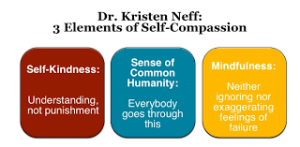Are you a compassionate person? If a friend or even a stranger is suffering a crisis, do you extend your compassion? Do you offer to help? Are you a good listener? Do you treat others with loving kindness? We are often quick to help others get through a bad time. But sometimes, we can ignore or downplay the suffering. We can forget to be compassionate with our self. When you are suffering, do you give the same kindness to yourself? Do you offer love and understanding? Perhaps it’s time to treat yourself like you treat a good friend or loved one.
When you practice self-compassion, you become more mindful of your emotions. Especially the negative emotions. Rather than avoiding your pain, you can understand that you are not alone in your suffering. Everyone suffers. Difficult and painful emotions are part of our common humanity. You can not experience life without experiencing pain, disappointment or sadness. When you treat yourself with compassion, it is simply a matter of treating yourself with kindness. It’s a way of alleviating some of your suffering.
Research tells us that when we treat ourselves kindly, we feel more safe and less threatened. We experience a sense of well-being. When we have a sense of connection with others, we suffer less stress, anxiety and depression. We feel as if we belong. We can relax. When we feel safe, we are better able to enjoy life.
Our bodies respond to this feeling of safety. Emotional well-being is reflected in the health and wellness of the physical body. Your body functions better in a tension-free environment. On a basic physiological level, when we feel safe, we deactivate our fight-flight response because we don’t feel the need to defend ourselves.
The difficult moments of life are just a part of the human experience. And in those moments, we also deserve to experience the kind and loving actions we offer to others. The strength of self-compassion promotes self-love and acceptance. It acknowledges that you are doing the best you can do. It also reminds you that you are worthy of happiness.
When you are being judgmental and critical of yourself, you are not exercising self-compassion. You are hurting yourself. Consider if you would speak to a friend in the same judgmental way. Focus on what is right, rather than what is wrong. Look at yourself with loving eyes before you treat yourself harshly. Be more tolerant of yourself. Respect your feelings. You deserve it.
Tolerance. Patience. Understanding. Compassion. What the world needs now.

